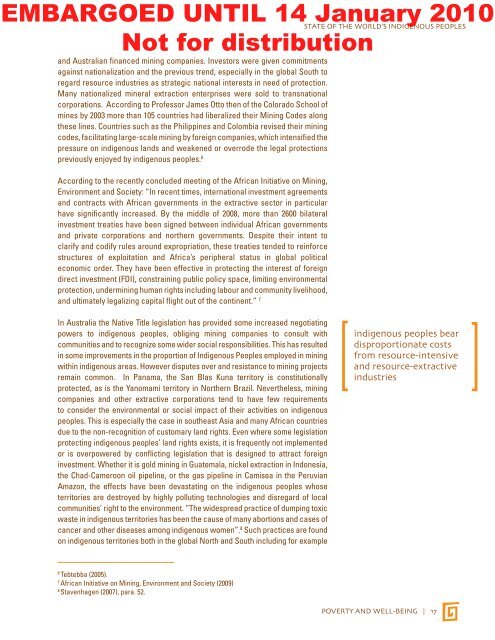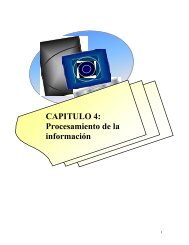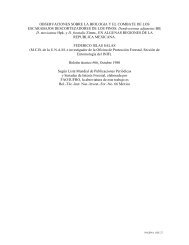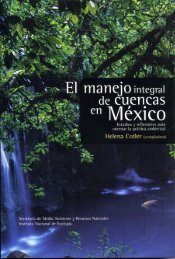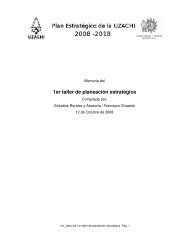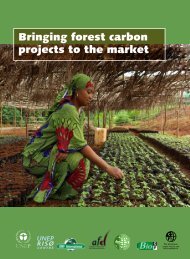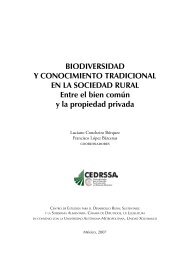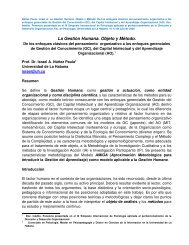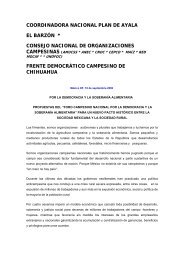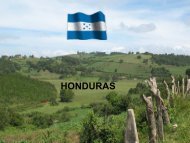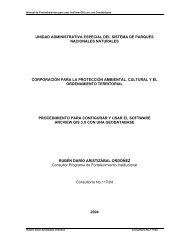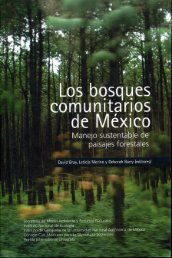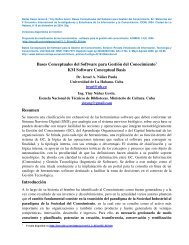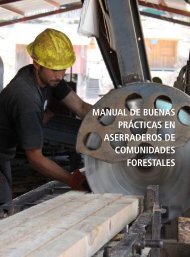STATE OF THE WORLD's INDIGENOUs PEOpLEs - CINU
STATE OF THE WORLD's INDIGENOUs PEOpLEs - CINU
STATE OF THE WORLD's INDIGENOUs PEOpLEs - CINU
- No tags were found...
Create successful ePaper yourself
Turn your PDF publications into a flip-book with our unique Google optimized e-Paper software.
EMBARGOED UNTIL 14 January 2010<strong>STATE</strong> <strong>OF</strong> <strong>THE</strong> WORLD’S INDIGENOUS PEOPLESNot for distributionand Australian financed mining companies. Investors were given commitmentsagainst nationalization and the previous trend, especially in the global South toregard resource industries as strategic national interests in need of protection.Many nationalized mineral extraction enterprises were sold to transnationalcorporations. According to Professor James Otto then of the Colorado School ofmines by 2003 more than 105 countries had liberalized their Mining Codes alongthese lines. Countries such as the Philippines and Colombia revised their miningcodes, facilitating large-scale mining by foreign companies, which intensified thepressure on indigenous lands and weakened or overrode the legal protectionspreviously enjoyed by indigenous peoples. 6According to the recently concluded meeting of the African Initiative on Mining,Environment and Society: “In recent times, international investment agreementsand contracts with African governments in the extractive sector in particularhave significantly increased. By the middle of 2008, more than 2600 bilateralinvestment treaties have been signed between individual African governmentsand private corporations and northern governments. Despite their intent toclarify and codify rules around expropriation, these treaties tended to reinforcestructures of exploitation and Africa’s peripheral status in global politicaleconomic order. They have been effective in protecting the interest of foreigndirect investment (FDI), constraining public policy space, limiting environmentalprotection, undermining human rights including labour and community livelihood,and ultimately legalizing capital flight out of the continent.” 7In Australia the Native Title legislation has provided some increased negotiatingpowers to indigenous peoples, obliging mining companies to consult withcommunities and to recognize some wider social responsibilities. This has resultedin some improvements in the proportion of Indigenous Peoples employed in miningwithin indigenous areas. However disputes over and resistance to mining projectsremain common. In Panama, the San Blas Kuna territory is constitutionallyprotected, as is the Yanomami territory in Northern Brazil. Nevertheless, miningcompanies and other extractive corporations tend to have few requirementsto consider the environmental or social impact of their activities on indigenouspeoples. This is especially the case in southeast Asia and many African countriesdue to the non-recognition of customary land rights. Even where some legislationprotecting indigenous peoples’ land rights exists, it is frequently not implementedor is overpowered by conflicting legislation that is designed to attract foreigninvestment. Whether it is gold mining in Guatemala, nickel extraction in Indonesia,the Chad-Cameroon oil pipeline, or the gas pipeline in Camisea in the PeruvianAmazon, the effects have been devastating on the indigenous peoples whoseterritories are destroyed by highly polluting technologies and disregard of localcommunities’ right to the environment. “The widespread practice of dumping toxicwaste in indigenous territories has been the cause of many abortions and cases ofcancer and other diseases among indigenous women”. 8 Such practices are foundon indigenous territories both in the global North and South including for exampleindigenous peoples beardisproportionate costsfrom resource-intensiveand resource-extractiveindustries6Tebtebba (2005).7African Initiative on Mining, Environment and Society (2009)8Stavenhagen (2007), para. 52.POVERTY AND WELL-BEING | 17


